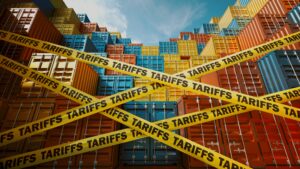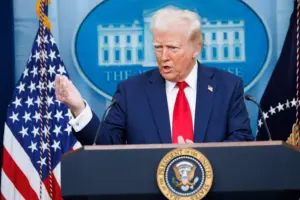As central banks worldwide move toward lower interest rates to stimulate economic growth, the U.S. Federal Reserve remains cautious. The Bank of England (BoE) became the latest major central bank to cut rates, lowering its benchmark rate by 25 basis points to 4.5%. This follows a similar move by the European Central Bank (ECB) on January 30. Additionally, the Reserve Bank of India is expected to cut its repo rate by 25 basis points, reflecting a broader trend among global policymakers seeking to ease economic pressures.
Despite this shift toward lower rates, the Federal Reserve remains noncommittal about its own policy direction. In December, the Fed projected two potential rate cuts in 2025, but with ongoing uncertainty surrounding President Donald Trump’s economic policies, those expectations now seem less certain. Unlike other central banks, the Fed faces unique challenges, including inflation risks and a strong U.S. dollar, which complicate its decision-making process.
The U.S. dollar has surged to its highest level in over two years, driven by strong economic performance and investor demand for U.S. assets. This has already affected multinational corporations, including Amazon, which cited the strong dollar as a factor weighing down its revenue expectations for the quarter. Amazon’s stock dropped more than 4% following its earnings report, reflecting investor concerns about slowing growth.
While the U.S. stock market showed mixed reactions to economic data, European markets rallied after the BoE’s rate cut. The Stoxx 600 index climbed 1.17%, reaching a record high, while the FTSE 100 gained 1.21%, also setting a new peak. In contrast, the Dow Jones Industrial Average declined by 0.28%, highlighting the uncertainty in U.S. markets.
Meanwhile, trade tensions between the U.S. and China continue to escalate. China has vowed to respond to new U.S. tariffs, with officials stating they will protect national interests against “one-sided acts of bullying.” However, China also expressed willingness to resolve trade disputes through diplomatic channels. This comes amid broader concerns that Trump’s trade policies could further disrupt global supply chains.
Additionally, the trade conflict has started to impact major companies. PVH Corp., the owner of Calvin Klein and Tommy Hilfiger, has been blacklisted by China, which may force it to close stores and shift production elsewhere. This move is part of an ongoing investigation into companies allegedly refusing to source cotton from China’s Xinjiang region.
Looking ahead, investors will closely watch the Fed’s next policy meeting, inflation trends, and any further developments in global trade relations. The divergence between U.S. and global monetary policies could create new risks and opportunities in financial markets.





